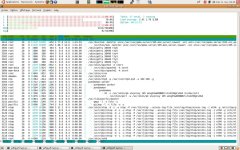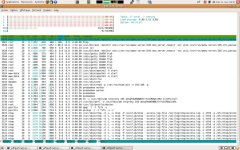Hi,
Strange freezing with a Gigabyte GA-P55m-UD2.
- Gigabyte GA-P55m-UD2
- Intel I5
- 2 HDD 500GO
- 8 GO DDR3
- PVE 1.4 up to date.
- 1 KVM
I really don't understand what's happen.
But after 30mn or 1h i have a ping freeze, not loosing packets, but ping with 18ms on VM and 9ms on eth0. After 10 mn all became normal.
top dont chow me overload on PVE and VM.
During the freeze usb keyboard on PVE double character on type.
After reading this http://www.proxmox.com/forum/showthread.php?t=2489
I use a 3COM network card and turn of mother boar card.
Same result.
Already changing motherboard and testmem is ok.
I try this on tow sites, changing switch and network cable.
I use my VM on a other PVE and all rocks (CORE 2 DUO server)
any suggestions are well come
Strange freezing with a Gigabyte GA-P55m-UD2.
- Gigabyte GA-P55m-UD2
- Intel I5
- 2 HDD 500GO
- 8 GO DDR3
- PVE 1.4 up to date.
- 1 KVM
I really don't understand what's happen.
But after 30mn or 1h i have a ping freeze, not loosing packets, but ping with 18ms on VM and 9ms on eth0. After 10 mn all became normal.
top dont chow me overload on PVE and VM.
During the freeze usb keyboard on PVE double character on type.
After reading this http://www.proxmox.com/forum/showthread.php?t=2489
I use a 3COM network card and turn of mother boar card.
Same result.
Already changing motherboard and testmem is ok.
I try this on tow sites, changing switch and network cable.
I use my VM on a other PVE and all rocks (CORE 2 DUO server)
Code:
lspci -v | grep -i "Ethernet"
04:00.0 Ethernet controller: Realtek Semiconductor Co., Ltd. RTL8111/8168B PCI Express Gigabit Ethernet controller (rev 03)
05:02.0 Ethernet controller: 3Com Corporation 3c905C-TX/TX-M [Tornado] (rev 78)
Code:
pveperf
CPU BOGOMIPS: 21321.69
REGEX/SECOND: 790201
HD SIZE: 94.49 GB (/dev/pve/root)
BUFFERED READS: 112.03 MB/sec
AVERAGE SEEK TIME: 9.02 ms
FSYNCS/SECOND: 935.04
DNS EXT: 462.29 ms
DNS INT: 921.33 ms
Code:
pveversion -v
pve-manager: 1.4-9 (pve-manager/1.4/4390)
qemu-server: 1.1-8
pve-kernel: 2.6.24-16
pve-qemu-kvm: 0.11.0-2
pve-firmware: 1
vncterm: 0.9-2
vzctl: 3.0.23-1pve3
vzdump: 1.2-5
vzprocps: 2.0.11-1dso2
vzquota: 3.0.11-1


